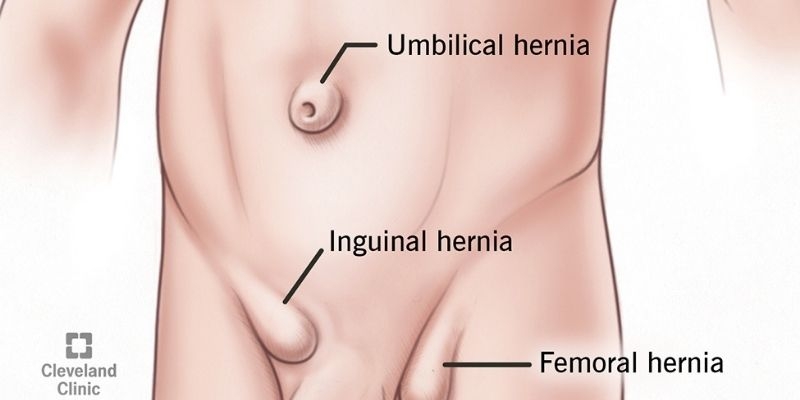When do you know when it’s Hernia?
2022-02-18 / RG STONE HOSPITAL / Hernia treatment

A serious illness can come suddenly, sometimes with little or no warning. You must seek the signs your body gives to keep it healthy. A hernia is one such disease that occurs when a bulge is noticed in the muscle or tissue that holds it in place. Mostly there are no life-threatening complications involved. However, surgery is suggested to prevent dangerous consequences.
What is Hernia?
A hernia occurs when an internal organ pushes through any weak spot present in the muscle or tissue. People may face a breakthrough in a weakened area in the intestinal area.
A hernia may also occur between your chest and hips or even in the upper thigh and the groin areas. It must be noted that most of the Hernia isn’t life-threatening, and however, they don’t even go on their own. But sometimes, they require surgery to prevent dangerous complications. It can occur in many ways; let’s see various types of Hernia in detail.
Types of Hernia
There are several types of Hernia, and we will explore some of the most common ones below:
Inguinal Hernia This is the most common type of Hernia. In this type of Hernia, the intestine is pushed through a weak spot or tear in the abdominal wall, often in the inguinal canal.
The inguinal canal is found in the groin area, where the spermatic cord passes from the stomach to the scrotum. This cord is attached to the testicles. This may occur in women; the inguinal canal has a ligament that helps hold the uterus in place.
These are more common in men because the testicles descend through the inguinal canal shortly after birth, and the channel closes completely behind them. But in some cases, it doesn’t close completely, leaving a weakened area.
-
Hiatal Hernia
This type of Hernia occurs when a part of the stomach starts protruding out through the diaphragm into the chest cavity. The diaphragm is a muscle that helps in efficient breathing by the contraction in the lungs. It helps separate organs in the abdomen area from the ones in your chest. This happens in patients who are over 50 years of age. If the child has a condition, it is caused by a congenital birth irregularity.
It is even caused due to gastroesophageal reflux diseases. In this, the contents leak backwards in the oesophagus area, creating a burning sensation.
-
Umbilical Hernia
This type of Hernia can affect children and babies. These occur when the intestines bulge out through the abdominal wall near the belly button.
This is the only type of Hernia that goes away on its own as the wall of the muscle gets stronger. This happens in the children of age group 1- 2 years of age. If this doesn’t go away by the age of 5, surgery needs to be performed to correct it.
Even adults can have umbilical hernias. This can occur due to the repetitive strain on the abdomen due to various health conditions like obesity, pregnancy, or fluid in the stomach.
-
Ventral Hernia
This type of Hernia is caused when the tissue bulges out through an opening in the muscles of your abdomen. You must notice that a ventral hernia decreases in size when you lie down.
A ventral hernia can occur either since birth or commonly acquired at any time during the lifetime. Some of the most common factors that cause ventral Hernia include obesity, pregnancy, and other strenuous activities.
What are Hernia Symptoms?
The most common problem people face is how to identify they have Hernia? One of the most common symptoms of Hernia is a bulge or lump on either side of the pubic bone, where the groin area and the thigh area meet.
Even the lump disappears when a person lies down. The Hernia can be felt when you touch when standing, bending, or coughing. The discomfort of pain generally occurs in the area around the lump.
What is the treatment for Hernia?
The most effective way to treat Hernia is through surgery. The need for surgery is completely dependent on the severity of the symptoms. Your doctor will monitor your Hernia and guide you through the possible complications. The process is known as watchful waiting.
In certain cases, wearing a truss might help to ease the symptoms. It is a supportive garment that helps to hold the Hernia in place. It would help if you connected with your doctor to ensure that the truss fits properly before you start using it.
If you have a hiatal hernia, OTC and prescription medications will help reduce the stomach acid, which will help relieve the discomfort.
Hernia Recovery
It is important to diagnose the symptoms of Hernia since untreated Hernia won’t go away itself. These can also cause various complications that may be life-threatening. A doctor can check your Hernia and determine the best treatment. If detected early, care and lifestyle change can minimize the symptoms. However, you can only treat Hernia with surgery.
The outlook of the people who undergo hernia repair surgery is generally good. It can even depend on the nature of Hernia, the symptoms, and your overall health. This can even recur after the surgery.
Categories
Hernia Repair
Appendicitis
Piles
Urological Treatment
Hernia treatment
Enlarged Prostate (BPH)
Gall Bladder Stone
Urinary / Kidney Stone
Vitamins
Indian Health Care System
Exercise
Obesity
Female Urinary Incontinence
Single Incision Laparoscopic Surgery (SILS)
Kidney Cancer
Bladder Cancer
Ovarian cancer
Nephrology
Bariatric Surgery
Kidney Function Test
Female Urology
Radiation Therapy
Alcoholic Fatty Liver
Liver disease
Gastroenterology
Kidney Disease

